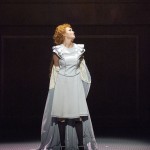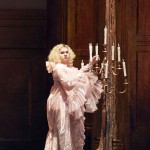![07_Tri_Sestri_88252_KHAYRULLOVA_GRITSKOVA_GARIFULLINA[1]](https://viennaoperareview.com/wp-content/uploads/2016/04/07_Tri_Sestri_88252_KHAYRULLOVA_GRITSKOVA_GARIFULLINA1-e1461415055737-1024x838.jpg) The genius of Chekhov is to make comedy out of his characters, stranded in Russia’s provincial backwaters, cut off from the Moscow society they crave; seeking happiness in work, frustrated love affairs, nostalgising over their past, idealising the future. It could all be so tragic were not these earnest characters so amusing, wittily interacting in Chekhov’s social gatherings. Like Shakespeare, Chekhov holds a fine balance between dark tragedy and light comedy.
The genius of Chekhov is to make comedy out of his characters, stranded in Russia’s provincial backwaters, cut off from the Moscow society they crave; seeking happiness in work, frustrated love affairs, nostalgising over their past, idealising the future. It could all be so tragic were not these earnest characters so amusing, wittily interacting in Chekhov’s social gatherings. Like Shakespeare, Chekhov holds a fine balance between dark tragedy and light comedy.
Pėter Eötvös’s 1998 opera Tri Sestri (co-libretto Claus Henneberg) is based on Chekhov’s play, but the plot isn’t a ‘linear’ narrative, but in three sequences, the story told from different perspectives. Eötvös uses ‘specific intervals, rhythms, and ranges of contrasting instruments’ to tell the story, so the flute identifies Olga, oboe Irina, clarinet Masha.
Chekhov’s plays speak to us in any language: they communicate humanity, human emotions, both joy and suffering. Eotvos’s vision, (if you can call it that), is often a nightmarish world of subconscious dreams: his characters sometimes ghost-like apparitions, floating across the stage, or frozen motionless. There’s no laughter, no comedy, no irony. No joy.
But there’s no doubting the quality of this, Vienna State Opera’s premiere production, with a superlative cast, many Russian, including the sisters; or of the creative staging (director Yuval Sharon: set Esther Bialas), however gloomy the concept.
In the Prologue, the three sisters are on swings: we shall find the cause of our distress, they sing. The set is rather creepy, a decaying palace, with huge doors either side, over-lit by candles. Eötvös’s music has strains of accordion; white smoke emanates from the doors. All that remains is memories, they sing. And life will start anew ; and there’ll be work : life ! The ‘girls’ are in white, frilly, ‘period’ (end 19th century) gowns. The swings ascend.
 In the first section, Irina, red-haired Aida Garifullina, discards her frock, down to her slip. ‘Everything’s forgotten, I’m getting so forgetful’, is her refrain. Garifullina’s Irina has a haunting fragility: her lyric soprano plaintive, exquisitely beautiful, was for me a highlight. We’ll never move to Moscow, she laments. Her dream is all dried up. She’s consoled by Olga, her older sister, (mezzo Ilseyar Khayrullova), in a tailored costume. Little sister, take my advice and marry the Baron Tuzenbach, (who Irina doesn’t love.) Olga holds her head as if suffering from severe headache, or migraine: a teacher, she carries their burden.
In the first section, Irina, red-haired Aida Garifullina, discards her frock, down to her slip. ‘Everything’s forgotten, I’m getting so forgetful’, is her refrain. Garifullina’s Irina has a haunting fragility: her lyric soprano plaintive, exquisitely beautiful, was for me a highlight. We’ll never move to Moscow, she laments. Her dream is all dried up. She’s consoled by Olga, her older sister, (mezzo Ilseyar Khayrullova), in a tailored costume. Little sister, take my advice and marry the Baron Tuzenbach, (who Irina doesn’t love.) Olga holds her head as if suffering from severe headache, or migraine: a teacher, she carries their burden.
Behind them, the third sister Masha (Margarita Gritskova), stunningly beautiful, silky black hair, sophisticated, in a kimono-like, exotically-patterned silk gown. On wafts a spirit figure in a fluttering lace night-gown, carrying a candelabra. Did she start the fire; there are murmurs. Other characters pass through on the moving stage.
Eötvös’s music is sparky, spooky rhythmic- featuring percussive effects, from huge, diverse drums, and with an emphasis on brass and woodwind. For the uninitiated, it could be the soundtrack for a horror movie: discordant, unsettling. Pėter Eötvös himself conducts a much-reduced Vienna State Opera orchestra in the pit; the larger orchestra play from a balcony backstage.
Soldiers appear in late 19th century tunics, wearing high boots. Tuzenbach, (baritone Boaz Daniel) pleads with Irina, ‘how long will I go on living with a deep passion for you.’ She, however, won’t speak of love. (In Chekhov, everybody’s in love with the wrong person, love passionately expressed, unrequited, rejected.) You’re so beautiful, Irina, Tuzenbach pleads on his knees. ‘So beautiful’, picks up Irina. But the three sisters’ lives have never been beautiful, she responds mournfully. He, the Baron, admits he’s never worked, or been useful to other people. Yet, he insists, he hates laziness in society! (His comment, you won’t be around in 25 years, thank God, is strangely prophetic- Chekhov’s play written 1901- as if intimating the Russian Revolution.)
But Irina is also being wooed by Solyony, who, in turn, declares his ‘boundless’ love. The handsome soldier Solyony (deep bass Victor Shevchenko) cannot live without her any longer. The tall black-haired , moustachioed Russian hunk grasps her to him; for the first time he’s bared his heart. He threatens to kill his rival Tuzenbach. She retreats, shaken, distancing herself, and takes refuge against a wall.
Natasha, that spectral figure, hovers over a cradle. She wants Irina to give up her room for Andrei’s son. We hear that the last soldiers are leaving next day. Irina, isolated, decides to marry Tuzenbach, and leave town with him. It is Olga- (‘How can I tell you’)- who breaks the news: the Baron was killed in a duel.
In the second sequence, from their brother Andrei’s perspective, Gabriel Bermudez- brown-suited, bespectacled, lank hair- sings in his aria of how tired he looks, how feeble he’s become. He’d dreamed of becoming a professor. (Irena, we glimpse, singing the ‘Everything’s forgotten’ aria). The sisters reproach him for neglecting his responsibilities: spineless, a tool used by Natasha to take control of the household. We see the hated stepmother, passing by with a burning candle. She floats around. Rather struts, as Natasha is played by counter-tenor Eric Juvenas.
Eotvos’s interlude is a gloomy brooding musical nightscape: as if probing the fearful subconscious of the protagonists. It’s relentless, like their fate.
Natasha emerges out of a closet (a towering wardrobe), now wearing a kitsch brown-silk patterned costume, her peroxide curls and big-bodied physique hinting at transgender. Fearsome, she thrusts herself bullyingly- a petty dictator. And like a Nazi sadist, she pushes the old servant, (who’d earlier pleaded with Olga to keep her on), out of her chair- too exhausted to stand, never mind work. Natasha’s taking over the house they’ve inherited from their father: (even instructing them all to move downstairs.)
Notable is the Doctor figure, to whom Andrei confesses he’s out of love with Natasha. The Doctor, (a remarkable performance by tenor Norbert Ernst), is one of Chekhov’s eccentrics, philosophising ‘existentially’. Devil take them all ! he sings in despair, that everyone expects miracles; but in reality, he can’t do a thing, bewailing the patients he couldn’t save. Then he breaks their mother’s old glass-clock. Is existence only an illusion?
(In Sharon’s scheme) the walls are covered in a black-and-white expressionist film , showing early footage of their mother. The hands of the clock projected onto the backstage are turned back. A masterstroke. Then all fades back to the grim wall-covering.
Passing across the stage are huge wardrobes – representing his claustrophobic existence – against which Andrei, Bermudez’s lyric baritone, sings how he was once cheerful, still romanticised. Then, his present and future shone. In Chekhov, this outburst would be sad, but comic; in Eötvös, however powerfully sung, it’s melancholic.
![05_Tri_Sestri_88311_GRITSKOVA[1]](https://viennaoperareview.com/wp-content/uploads/2016/04/05_Tri_Sestri_88311_GRITSKOVA11-e1461582313515-150x150.jpg) In Sequence 3, devoted to Masha, Gritskova tall, her long hair coiffed, chic in a gold trouser suit. In this take, the sisters celebrating Irina’s ‘name day’ drink tea with officers. They’re joined by Colonel Vershinin (Clemens Unterreiner, a dramatic baritone). The future looks so beautiful, fantastic sings Vershinin.
In Sequence 3, devoted to Masha, Gritskova tall, her long hair coiffed, chic in a gold trouser suit. In this take, the sisters celebrating Irina’s ‘name day’ drink tea with officers. They’re joined by Colonel Vershinin (Clemens Unterreiner, a dramatic baritone). The future looks so beautiful, fantastic sings Vershinin.
She’s having an affair. Masha, with a long cigarette holder, is presented as the modern woman. They ‘married her off when she as just 18 years old.’ To Kulygin (Dan Paul Dumitrescu), gross, paunchy, balding, in a tobacco-coloured suit; no disrespect, Dumitrescu’s a magnificent bass.
Vershinin , unhappily married, confides in Masha, he’s in love with her; but is repulsed. Masha later confesses to Olga she’s desperately in love with him. Olga objects; if she were married, she would stay home and love her husband.
Silver-grey trees on stage representing a forest. The three sisters are standing front of stage. As if in a tableau, a military band play on a balcony. Vershinin says farewell ; Masha clings passionately to him. ‘Write to me…Let me go’; he appeals to Olga for help. ‘It’s alright, it’s alright.’ Olga waves; Masha stands languidly. ‘God, where has everything vanished’, again Irina’s refrain. Then a (wardrobe) frame, through which Irina exits into space- anticipating the surrealism of a Dali painting.
“If only we knew, if only we knew”, so ends Chekhov’s play on a note of optimism and sadness. Eötvös’s opera, supposedly after Chekhov, is a darker world without hope. I prefer the play , but I’d like to hear the music again. This cast, this Vienna State Opera production, (conducted by Eötvös), is surely definitive.© P.R. 16.03.2016
Photos: Ilseyar Khayrullova (Olga), Margarita Gritskova (Masha), Aida Garifullina (Irina); Aida Garifullina (Irina); Eric Jurenas (Natasha); Margarita Gritskova (Masha)
© Wiener Staatsoper/ Michael Pöhn
viennaoperareview.com
Vienna's English opera blog

Just commenting to register my support. Your
opinion is well thought out Good job!
Hey this post certainly made me think! Thank You-I wouldn’t have considered things this way otherwise.